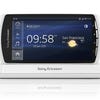Xperia Play
The Eurogamer verdict.
The Android interface
During the course of this review we've spoken almost exclusively about the Xperia Play's gaming credentials, but it's easy to forget that this is a telecommunications device first and foremost – despite the 'PlayStation Phone' publicity.
Thanks to the inclusion of Android 2.3 – also known as Gingerbread – the Xperia Play is very much at the vanguard of Google's mobile OS. Like rival manufacturers HTC and Samsung, Sony Ericsson has chosen to 'skin' the OS with its own user interface. The results are reasonably positive, although they fall short of HTC's intuitive and jaw-droppingly gorgeous Sense UI.
Like all Android devices, the Xperia Play is highly customisable. You can re-arrange the layout of your five home screens in any manner you desire, and real-time widgets offer at-a-glance updates on a whole selection of different topics – be they your Twitter timeline or the latest news. Android is buttressed by an app store that now boasts a staggering 200,000 downloads, many of which are games.
Android's year-on-year growth is nothing short of stunning, and more users means increased support from developers. It's this fact that should enable the Xperia Play to avoid sharing the same unpleasant end as the N-Gage; because its fortunes aren't tied up exclusively in its own retail performance, it's virtually guaranteed a flood of apps and games in the future. Android's future is looking rosy, and the Xperia Play will benefit from at least some of that good fortune.
There are drawbacks to Android, however. Because it's such a versatile piece of software, you can expect to see at least one application 'force close' event per day, possibly even more. Compared to the relatively rock-steady iPhone, Android often feels shaky and unreliable - although by the same token it's arguably a more vibrant, exciting and (possibly most importantly) open platform. In a battle which echoes the "Genesis does what Nintendon't" Sega of America campaign from the early nineties, Android and iOS both have their positives and negatives, and while they tussle like two burly kids fighting for the last slice of pie, the rest of the market is struggling to pick up the scraps.
Using the Xperia Play
After numerous months of idle speculation and finger-crossing, it was almost inevitable that the 'PlayStation Phone' would fail to live up to the almost impossible level of expectation - after all, this isn't the PSP2, and was never intended to be. There are elements of the Xperia Play that are very disappointing: the bulky design, the below-par screen, the fragmented manner in which games are presented; it's clear that there's plenty of room for improvement in whatever device follows in its footsteps.
However, gazing into the future is doing a disservice to what we have in the present. The Xperia Play may have its faults, but as a platform that fuses both telecommunications and gaming, it's one of the best we've seen so far. The physical controls are fantastic, and the mere thought of playing Final Fantasy VII or Gran Turismo on our phone has us skipping around the room like excited schoolchildren. Add to this the blissful prospect of carrying around 30 years of gaming heritage in your pocket thanks to the Android Market's repository of emulators and you've got one hell of a portable gaming paradise.
The biggest bonus is that unlike PSPgo or 3DS, the Xperia Play is always going to be at your side, because it's a core lifestyle device; the kind of thing you check your pockets for when you leave the house, right after your keys. This is one element which has contributed vastly to the success of gaming on the iPhone, and there's a good chance that Sony Ericsson's latest mobile could benefit equally.
The Xperia Play certainly deserves to be a success – if only to prove that physical interfaces are still relevant to modern mobile gamers in a world where Angry Birds can accrue millions of downloads within the space of just a few days. But whether or not Sony Ericsson has the determination, drive and capability to make it one remains to be seen. If the company can ensure a steady flow of 32-bit PlayStation titles and encourage developers to produce exclusive games which take full advantage of the Xperia Play's unique control setup, then it stands an excellent chance of avoiding the cruel fate which befell Nokia's equally-hyped N-Gage all those years ago.










